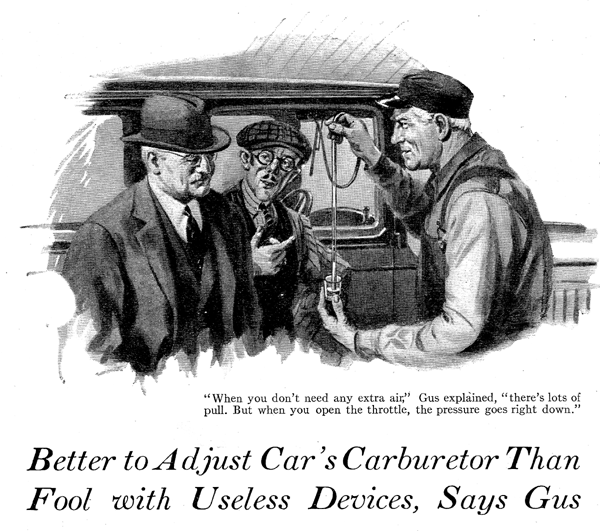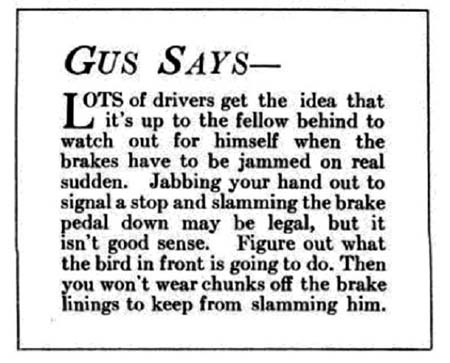July 1930
YOU CAN'T SAVE GAS WITH GADGETS
by Martin Bunn

"This looks pretty good to me," said John Southby, the local jeweler, as he stopped in front of the Model Garage and handed a brightly colored circular to Gus Wilson, veteran auto mechanic.
"Can you get one and fit it to my car?" he asked. "The circular says it's a new invention that will give twice as much mileage on the same gasoline and make the motor more powerful."
Gus grinned disgustedly as he thumbed the circular.
"I've seen this one before," he said. "It's a phony gadget that doesn't work."
"But it's a patented invention," Southby protested. "Surely it must be some good, or the Government wouldn't issue a patent. Besides, look at all the testimonials. There's one from a man with a car just like mine. He says he got forty-seven miles on a gallon of gas."
"I don't care if he said he'd traveled from New York to "Frisco on a thimbleful," Gus growled. "And the fact that it's patented doesn't mean anything either. If somebody sent you a circular advertising a machine that would turn silver into gold, would you buy it?"
"Certainly not," said Southby. "I'd know it was a fake. But this isn't the same kind of a proposition."
"Oh but it is," Gus maintained. "This fellow claims to know more about carburetors than all the experts of all the auto factories put together, and on top of that he's trying to sell you an idea that's at least fifteen years old. There's nothing new about a device that lets extra air into the auto manifold between the carburetor and the cylinder block. They were selling them years ago -- and then they didn't work any better then than they do now."
"Well, maybe you're right," grumbled Southby, "but the idea seems logical to me. If you let more air into the manifold when the motor speeds up you ought to get more power."
"That's how it looks at first glance," Gus explained, "but it's actually the other way round. Wait just a minute."
Gus walked into the garage and rummaged around in the drawer of one of the workbenches. Then he came out again with a long piece of glass tubing and a small glass with some mercury in it.
"Years ago," he began, "I had an argument about one of these gas savers, and I worked out this way of proving my point.
"First we'll disconnect the air hose from your windshield wiper and slip it over the end of this glass tube. Then we'll stick the end of the tube in the mercury. Now start your engine and see what happens."
Southby stepped on the starter and then came around to watch Gus.
"Now your motor is idling nice and smooth," said Gus, "and you'll notice that the mercury has crawled up the tube quite a ways.
"Joe, he said to Joe Clark, his partner, who had joined the two men, "step on the throttle a minute."
Joe did as requested and Southby noted that the instant the throttle was opened the mercury in the tube, dropped.
"See what happened?' exclaimed Gus. "When you don't need any extra air in the manifold -- that is, when the motor is idling slow -- there's lots of pull or, in other words, pretty good vacuum in the manifold. But when you open the throttle, the pressure goes right down. How in the world can any device give results that're up against pressure conditions like that? The more you open the throttle, and particularly on a steep hill where the motor is slowed down by the load, the less difference there is between the pressure inside the manifold and the air pressure which could force in extra air."
"Huh," grunted Southby, "looks as if they had the cart before the horse."
"They certainly have," Gus agreed. "A laboratory made a test of manifold pressure a while ago with an automobile motor. They set the throttle for a five degree opening and then put a load on the motor so that it could only turn five hundred revolutions a minute. The pressure inside the manifold went up to fourteen pounds. Not an awful lot of air is going to squirt into the manifold when the pressure inside is fourteen pounds and atmospheric pressure outside is only fourteen and seven-tenths pounds. They tried the same stunt with the motor running at two thousand revolutions a minute. With a five-degree throttle opening, the pressure in the manifold was three pounds, and when they opened the throttle up to twenty degrees the pressure went up to eleven pounds. That's exactly the same story all over again. If the extra air could do any good at all, it would he needed at the wider throttle opening, which is just where you wouldn't get it."
"How about all those testimonials?" asked Southby.
"Well," said Gus, "It's astonishing how many people like to fool themselves. Besides that, most carburetors are set for too rich mixture, so almost anything that will add a little bit more air will cut down the gasoline used. Of course, they'd get better results by adjusting the carburetor for a leaner mixture without bothering with any extra gadget."
"Isn't there anything to this idea of adding extra air to the manifold?" asked Southby.
"There is," said Gus, "but not by any automatic device. If you want to go to the trouble of fitting a valve in the manifold between the carburetor and the cylinder block and arranging a hand control so that you can open or close it while you are driving the car, you can run up the gas mileage and also cut down the carbon deposit some."
"Why couldn't they produce an automatic device to do the same thing?" asked Southby. "Perhaps they could," said Gus, "but all the carburetor experts in the world haven't been able to do it yet. If you want, I'll adjust your carburetor for a thin mixture, but you won't be able to climb hills quite so well as you can with a thick mixture."
"Aw, forget it," said Southby, "I'd rather use more gas and get up the hills easier."
END
L. Osbone 2019
